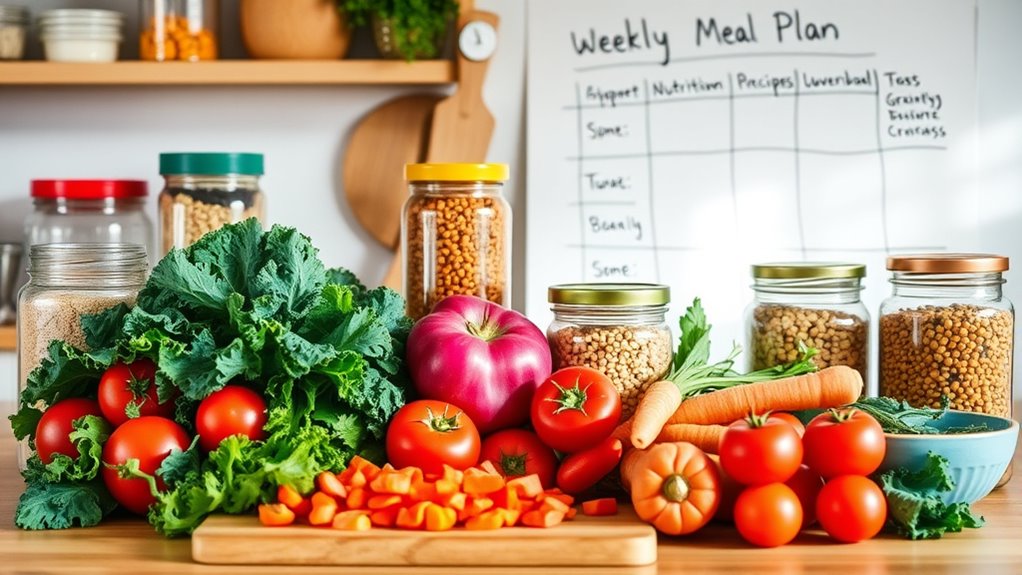To eat healthy on a budget, set a realistic weekly spending limit and stick to it. Plan your meals around affordable, nutrient-dense ingredients like beans, eggs, frozen vegetables, and whole grains. Make a detailed shopping list, look for deals, and use coupons to save money. Batch cook and portion meals to avoid waste and overspending. Keep exploring these tips to discover even more ways to eat well without breaking the bank.
Key Takeaways
- Set a realistic weekly budget and shop during sales, using coupons and avoiding impulse purchases to maximize savings.
- Plan meals around affordable, nutrient-dense staples like beans, eggs, frozen vegetables, and whole grains.
- Prepare meals in bulk and control portions to save time, reduce waste, and lower food costs.
- Buy in bulk and utilize store promotions, digital coupons, and loyalty programs for long-term savings.
- Store food properly and use leftovers creatively to minimize waste and stretch your budget further.
Set a Realistic Weekly Budget and Stick to It
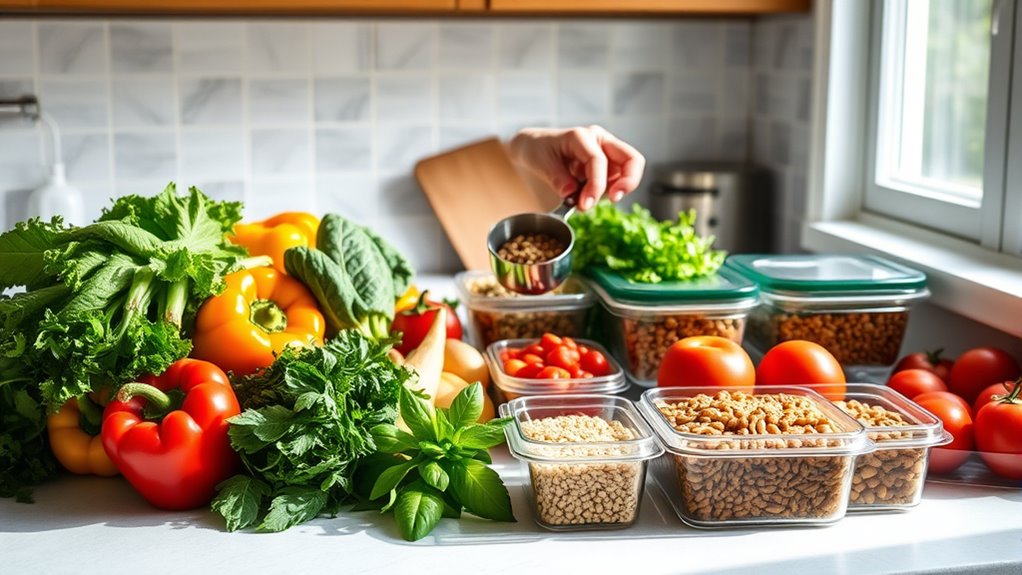
Creating a realistic weekly budget is essential for eating healthy without overspending. Start by determining a meal budget that aligns with your financial situation and dietary goals. This involves careful weekly planning to allocate funds for groceries, snacks, and beverages. Be honest about your spending habits and set limits that prevent impulse buys or unnecessary expenses. When you plan your meals, consider affordable, nutritious ingredients to maximize your budget. Stick to your plan and avoid temptations to splurge on non-essential items. Regularly reviewing your weekly spending helps you stay on track and adjust your meal budget as needed. Incorporating calorie control into your planning can help you maintain a balanced diet while sticking to your budget. Being mindful of portion sizes can further support your efforts to eat healthily and economically. Additionally, understanding the importance of grocery savings strategies can help you make smarter choices and stretch your budget further. Consistency is key—by establishing and adhering to a realistic budget, you’ll make healthier choices without breaking the bank.
Plan Your Meals Around Budget-Friendly Ingredients

To make the most of your grocery budget, focus on planning meals around affordable, nutrient-dense ingredients. Using ingredient substitution can stretch your dollar without sacrificing nutrition. For example, swap rice for lentils or canned beans instead of fresh ones—they’re cheaper and versatile. Incorporate seasonal vegetables, which are often less expensive and flavor-rich. Keep flavor enhancement in mind by adding herbs and spices instead of costly sauces. Consider these budget-friendly ingredients:
Save money with versatile, nutrient-rich ingredients like lentils, canned beans, seasonal produce, and flavorful herbs.
- Frozen vegetables
- Canned fish or beans
- Whole grains like oats and brown rice
- Eggs
- Seasonal produce
These ingredients not only save money but also provide variety and flavor. Additionally, meal planning can help you avoid impulse purchases and reduce food waste, maximizing your savings. Being mindful of nutrient-dense ingredients ensures that each meal provides essential vitamins and minerals without inflating your grocery bill. By choosing versatile, affordable staples, you can create nutritious, tasty meals that align with your budget and support Volkswagen Tuning enthusiasts’ approach to optimization—maximizing value while enhancing performance.
Make a Shopping List and Practice Smart Shopping

Before heading to the store, make a detailed shopping list to stay focused and avoid overspending. Check weekly flyers for deals, buy in bulk when possible, and steer clear of impulse purchases. These smart shopping habits help you eat healthy without breaking the bank. Additionally, considering energy-efficient electric bikes can support sustainable transportation options and reduce your carbon footprint. Incorporating water-saving tips can also help conserve resources and lower utility costs while maintaining a healthy lifestyle. Understanding your cookie preferences allows you to manage online privacy and ensure a secure shopping experience. Recognizing the importance of AI bifurcation can also prepare you for potential changes in the job market and societal structures. Engaging in content quality and topical authority strategies can further boost your online presence and ensure your content remains relevant.
Check Weekly Flyers
Checking weekly flyers is a smart way to find the best deals on healthy foods. By reviewing store circulars, you can spot weekly flyer deals on produce, lean meats, and dairy, saving you money. Planning your shopping around these deals helps you stay on budget while eating nutritious meals. To maximize savings, consider:
- Comparing prices across multiple stores
- Making a list based on current discounts
- Prioritizing sale items over regular-priced products
- Avoiding impulse buys on non-essentials
- Shopping during sales events or special promotions
- Incorporating eco-friendly materials into your shopping routine to choose sustainable packaging and products. Being mindful of environmental considerations ensures your shopping habits support sustainability and conservation efforts. Additionally, selecting sustainable packaging options can reduce waste and lessen your environmental impact. Utilizing digital coupons can further boost your savings while promoting eco-conscious choices.
Buy in Bulk
Buying in bulk can markedly lower your grocery bill when you make a detailed shopping list and shop smartly. Look for bulk discounts on staples like rice, beans, and oats, which store well and last long. Before heading to the store, plan your meals and determine quantities to avoid waste. Bring sturdy storage containers to keep your bulk purchases fresh and organized at home. Proper storage helps prevent spoilage and makes it easy to access ingredients quickly. Shopping in bulk saves money and reduces trips to the store. Focus on versatile items you know you’ll use often. Additionally, choosing lifestyle-focused products that enhance your daily routines can make your meal planning more efficient and sustainable in the long run. Incorporating meal prep strategies can also help you stick to your budget and ensure healthy options are always available. To maximize the benefits, familiarize yourself with food storage techniques that extend the shelf life of bulk items and maintain their quality over time. Understanding proper storage methods can significantly reduce waste and keep your ingredients fresh longer. Being aware of food preservation methods can also help you make the most of seasonal or bulk produce.
Avoid Impulse Buys
After shopping in bulk, staying focused on your actual needs helps maximize your savings. To avoid impulse buys, always make a detailed shopping list beforehand. This keeps you on track and prevents unnecessary purchases, especially when faced with snack attacks or tempting treats. Be mindful of store layout; items near checkout or end caps often lure you into buying more. Stick to your list and avoid wandering aisles aimlessly. Consider shopping during off-peak hours to reduce distractions and impulse temptations. Keep a mental note of your budget, and if you’re tempted by extras, ask yourself if you truly need them. Planning ahead guarantees you make smarter choices, saving money and supporting your goal of eating healthy on a budget. Additionally, understanding investment diversification can help you allocate resources wisely, ensuring your financial stability while maintaining healthy eating habits.
Embrace Batch Cooking and Meal Prep
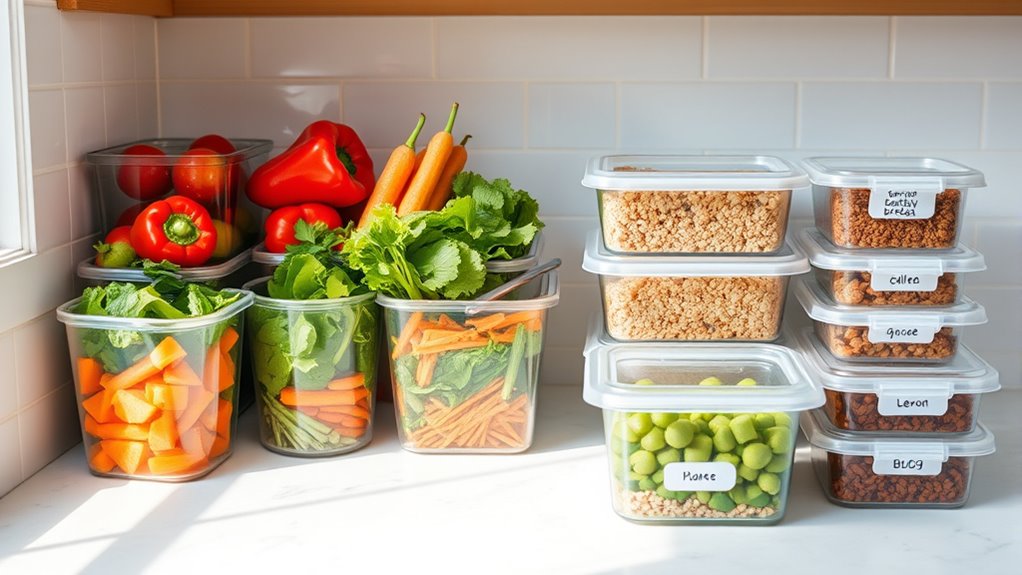
By batch cooking and meal prepping, you save time during busy weekdays and reduce the temptation to eat out. It also helps you control portion sizes, so you don’t waste food or money. These habits make it easier to stay on track with healthy eating without breaking the bank.
Meal Prep Saves Time
Batch cooking and meal prep are powerful strategies to save time during busy weeks. They maximize meal prep benefits by reducing daily cooking and cleanup, giving you more time for other priorities. By dedicating a few hours once or twice a week, you can prepare multiple meals that last several days. This approach streamlines your routine and minimizes last-minute cooking stress. Incorporating reliable tools like an electric bike conversion kit can also help you save time and energy in other aspects of your routine, making healthy living more manageable. Electric bike conversion kits can facilitate easier commuting, giving you more time and motivation to focus on meal planning. Incorporate these time-saving strategies to stay on track with healthy eating while sticking to your budget.
Some key benefits include:
- Reduced daily decision-making
- Less frequent grocery trips
- Minimized cooking time during the week
- Lower temptation to order takeout
- Better portion control and waste reduction
Embracing batch cooking guarantees healthy meals are always ready, saving you time and effort.
Portion Control Benefits
Meal prepping not only saves time but also makes it easier to control portion sizes. When you prepare your meals in advance, you can divide servings into appropriate portions, helping you avoid overeating. This supports mindful eating, so you pay attention to your hunger cues instead of mindlessly consuming excess food. Consistent portion control can reduce food waste and save money, making healthy eating more affordable. Using containers to store pre-portioned meals encourages you to stick to balanced servings and prevents impulsive snacking. Over time, this habit helps you develop better awareness of serving sizes and promotes healthier eating patterns. Embracing batch cooking and meal prep empowers you to enjoy nutritious meals without guilt and with more control over your overall diet.
Use Store Promotions and Coupons Wisely
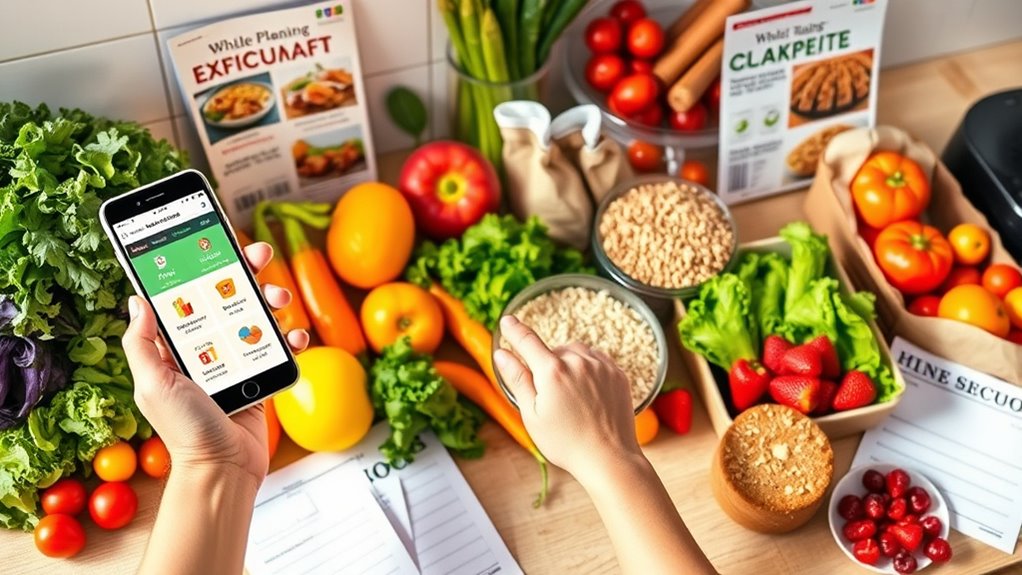
Taking advantage of store promotions and coupons can particularly reduce your grocery bills, especially when you’re mindful of your budget. By leveraging store loyalty programs, you can earn discounts and exclusive deals that save you money on healthy foods. Digital coupons make it easy to access discounts right from your phone, so you never miss out on savings. To maximize benefits, consider these tips:
- Sign up for store loyalty programs
- Download store apps for digital coupons
- Plan your shopping around weekly promotions
- Use cashback offers when available
- Match coupons with store sales for extra savings
Being strategic with promotions and coupons allows you to buy nutritious foods at lower prices, making healthy eating more affordable without sacrificing quality or variety.
Incorporate Affordable, Nutrient-Dense Foods
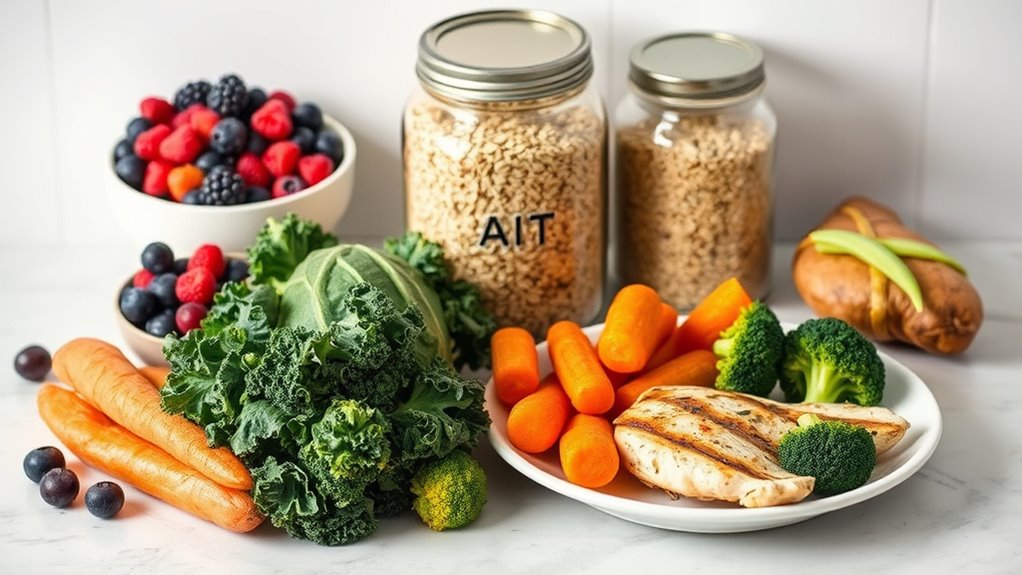
Incorporating affordable, nutrient-dense foods into your diet is a smart way to eat healthy without overspending. Focus on adding budget-friendly ingredients like beans, lentils, eggs, frozen vegetables, and whole grains. These nutrient-dense foods provide essential vitamins, minerals, and fiber without breaking the bank. For example, canned beans and frozen spinach are cost-effective options that boost your meals’ nutritional value. Incorporate these ingredients into soups, salads, or stir-fries to maximize their benefits. By choosing nutrient-dense foods, you ensure your body gets the nourishment it needs while keeping costs low. Planning your meals around these budget-friendly ingredients helps you maintain a balanced diet without sacrificing quality or savings.
Minimize Food Waste to Maximize Your Budget

By choosing nutrient-dense, budget-friendly foods, you’re already making smart financial decisions. To truly maximize your budget, focus on minimizing food waste. Proper food storage prevents spoilage and extends the life of produce, leftovers, and pantry staples. Use airtight containers and store perishable items in the fridge or freezer when appropriate. Practice composting tips to turn food scraps into nutrient-rich soil, reducing waste and supporting your garden. Be mindful of expiration dates, plan meals to use ingredients efficiently, and repurpose leftovers creatively. For example:
- Store greens with a paper towel to keep them fresh longer
- Freeze overripe fruits for smoothies or baking
- Use vegetable scraps for homemade broth
- Label leftovers with date to avoid forgetting them
- Compost vegetable peels and coffee grounds regularly
These habits help stretch your food dollars further while reducing environmental impact.
Frequently Asked Questions
How Can I Stay Motivated to Stick to My Meal Plan Weekly?
Staying motivated to stick to your meal plan can be tough, but you can do it with effective goal setting techniques and meal prep strategies. Remind yourself of your health goals and track your progress to stay inspired. Planning ahead makes it easier to avoid temptations, and prepping meals in advance keeps you on track. Celebrate small wins to boost your motivation and maintain consistency throughout the week.
What Are Some Cost-Effective Protein Sources for Everyday Meals?
Imagine your pantry as a treasure trove; some gems are more affordable and versatile than you’d think. You can incorporate plant-based options like beans, lentils, and chickpeas as cost-effective protein sources for your daily meals. Pantry staples such as canned tuna, eggs, and peanut butter also pack a protein punch. These options not only save you money but keep your meals nutritious and satisfying, helping you stay on track effortlessly.
How Do I Handle Dietary Restrictions While Budgeting?
When handling dietary restrictions while budgeting, you can focus on affordable gluten-free options like rice, potatoes, and oats. Incorporate vegetarian substitutes such as beans, lentils, and tofu to save money and meet your needs. Plan meals around these budget-friendly ingredients, buy in bulk, and look for sales. By being flexible and creative with these options, you can maintain a healthy diet without overspending.
Are There Any Apps to Help Track Grocery Spending Effectively?
You’re wondering if there are spending apps to help with grocery budgeting. Yes, many apps like Mint, YNAB, and PocketGuard track your grocery spending effectively. They sync with your bank accounts, categorize expenses, and set budgets, making it easier to monitor your spending and stay on track. Using these apps, you gain better control of your grocery budget while ensuring you spend wisely and avoid overspending.
How Can I Involve Family Members in Budget-Friendly Meal Planning?
Getting your family involved in budget-friendly meal planning means sharing family meal ideas, involving children in grocery shopping, and encouraging everyone’s input. You can turn meal prep into fun activities, ask for their favorite healthy options, and teach kids about smart shopping. By making them part of the process, you foster teamwork, teach responsibility, and create a sense of ownership, all while sticking to your budget and enjoying nutritious, delicious meals together.
Conclusion
Sticking to your budget is like tending a garden—you need patience, care, and a bit of planning. When you choose affordable, nutritious foods and avoid waste, you’re planting seeds for a healthier life without draining your wallet. Each smart decision is a drop of water nourishing your well-being. Keep nurturing these habits, and watch your health bloom as vibrant and resilient as a well-tended garden, thriving on the richness of mindful choices.

